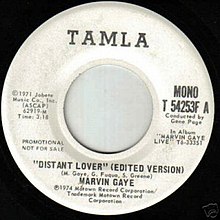Distant Lover
| "Distant Lover" | ||||
|---|---|---|---|---|
| Song by Marvin Gaye | ||||
| from the album Let's Get It On | ||||
| Released | 1973 | |||
| Recorded | November 3, 4, 6, 20, 24, 25 and 30, December 5, 13 and 20, 1970; January 21 and 27, March 10, 11, 12 & 13; April 10 and 11, 1972 Hitsville U.S.A. (Detroit, Michigan) April 27, July 6 and 20, 1973 (over-dubbing) Hitsville West (Hollywood, California) |
|||
| Genre | Soul, quiet storm | |||
| Length | 4:15 | |||
| Label | Tamla | |||
| Songwriter(s) | Marvin Gaye, Gwen Gordy Fuqua, Sandra Greene | |||
| Producer(s) | Marvin Gaye | |||
| Let's Get It On track listing | ||||
|
||||
|
|
||||
| "Distant Lover (live)" | ||||
|---|---|---|---|---|
 |
||||
| Single by Marvin Gaye | ||||
| from the album Marvin Gaye Live! | ||||
| Released | June 28, 1974 | |||
| Recorded | January 4, 1974 Oakland Coliseum (Oakland, California) |
|||
| Genre | Soul | |||
| Length |
6:20 (album version) 4:30 (single version) |
|||
| Label | Tamla | |||
| Songwriter(s) | Marvin Gaye, Gwen Gordy Fuqua, Sandra Greene | |||
| Producer(s) | Marvin Gaye | |||
| Marvin Gaye singles chronology | ||||
|
||||
"Distant Lover" is the sixth song issued on singer Marvin Gaye's 1973 album, Let's Get It On and the b-side of the second single from that album, "Come Get to This." A live recording was issued as a single in 1974. The live version of the song was Gaye's most successful single during the three-year gap between Let's Get It On and his following 1976 album, I Want You.
Marvin composed the melody of the song with songwriter Sandra Greene during a 1970 recording session while Gaye was finishing edits of his song, "What's Going On". Recorded on November 3, 1970, Gaye first recorded a rough version simply titled "Head Title". Later in the same recording sessions, with help from his sister-in-law, Gwen Gordy Fuqua, Gaye composed more lyrics and gave it its title, "Distant Lover". Gaye would rework the song several times during the 1970 recording sessions. In the "Head Title" version, Gaye began singing his lyrics "right off the top of my head" and performed in a rasp-influenced growl. Two mixes of the "Head Title" version was released posthumously on reissues of Gaye's What's Going On album.
The first version, which mixed vocals from another session of the song in what was perceived as a "rough mix", was issued on the 30th anniversary deluxe edition issue of the album in 2001. Ten years later, in 2011, Motown historian Harry Weinger discovered the disregarded "original mix" of the song, which was more polished and featured more lyrics as the other version issued in 2001 had cut off parts of the second chorus' lyrics. This original mix was issued on the 40th anniversary re-issue of the album. In both versions of the "Head Title", Gaye was accompanied by songwriter and confidant Elgie Stover as he ad-libbed a pained speaking vocal, at times screaming in falsetto during Gaye's performance. At the end of both versions, a female voice, later confirmed to be Denise Gordy, Gaye's niece-in-law and mother of his adopted son, Marvin III, could be heard speaking to Marvin.
Gaye eventually recorded the final versions of the song during the Let's Get It On recording sessions, recording several takes. One of the alternate takes was later issued on the deluxe edition re-issue of Let's Get It On and featured the saxophone intro by Eli Fontaine as the "Head Title" versions had done. In the version that was overdubbed for the final track listing of Let's Get It On, the saxophone intro in the beginning was edited out. There also appeared to be sounds of microphone bleed that was reverberated while Gaye was singing and simple drum beats. In the alternate take of "Come Get to This" after the song ends, the voices of Gaye and Denise Gordy taken from the earlier 1970 sessions, could be heard before the beginning of the alternate vocal of "Distant Lover". In the finished version, Gaye sung in both a falsetto and a tenor voice, begging and pleading for his lover to "come back home" in a raspy growl. According to the liner notes of the Deluxe reissue of Let's Get It On, it took twenty separate recording sessions before Marvin was satisfied with the song-more dates than it took to record the entire What's Going On album. Of the studio version, an Allmusic reviewer wrote:
...
Wikipedia
